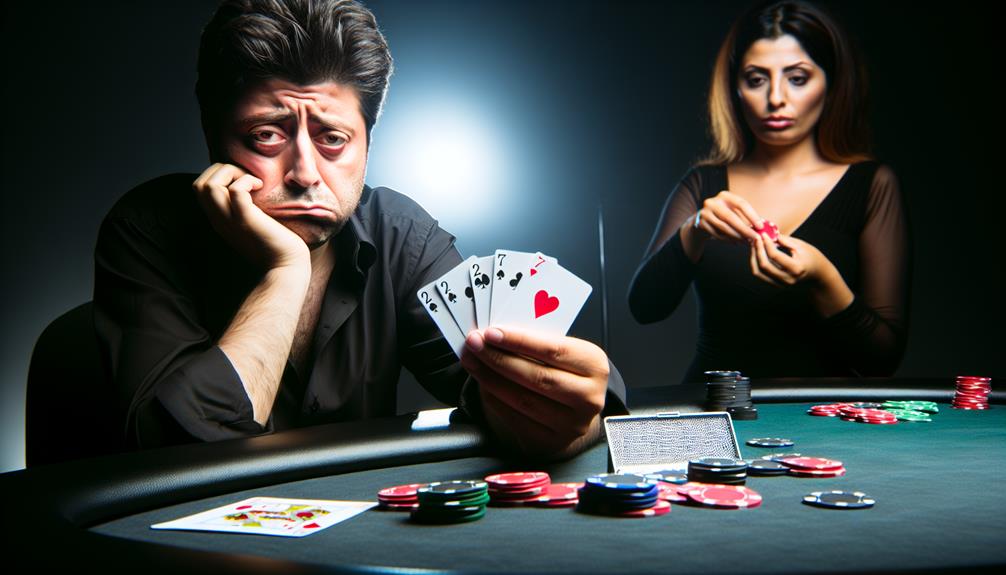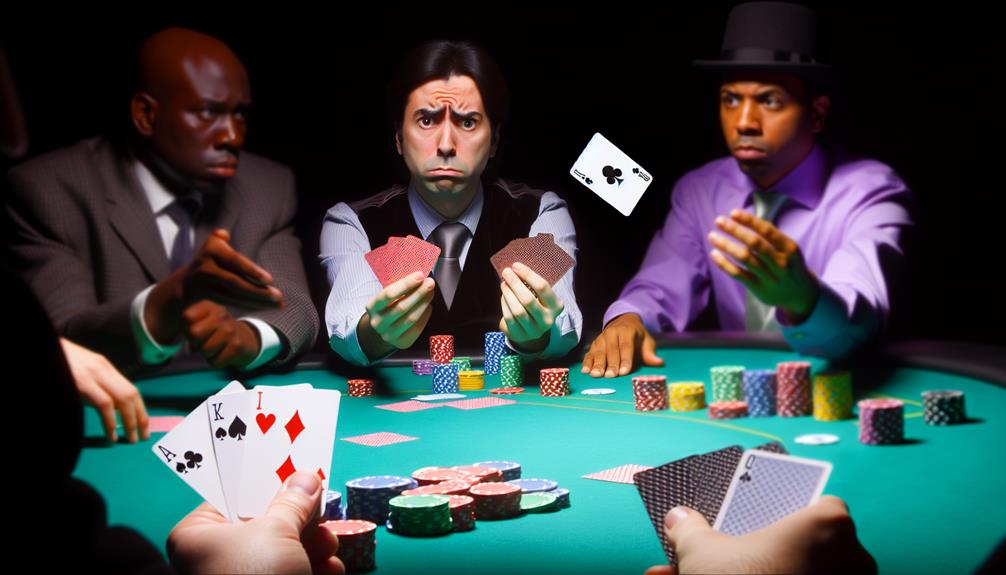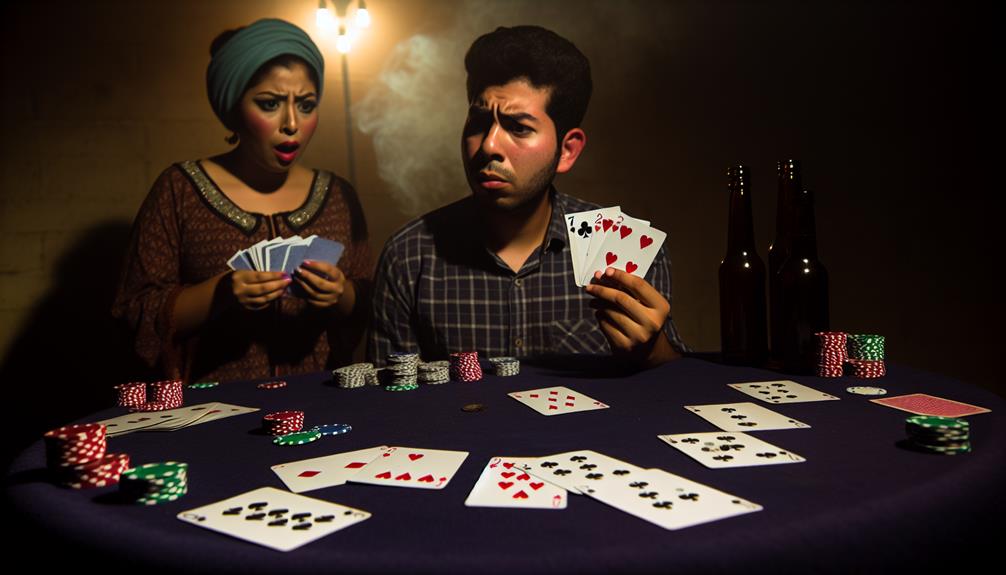The 7-2 offsuit is universally considered the worst starting hand in poker and should be entirely avoided in any effective strategy. This hand ranks low due to its low card values and lack of potential for strong combinations, making it virtually unplayable. Players often misjudge its value, leading to poor decision-making and significant losses. Holding onto this hand can harm one's credibility at the table and foster negative emotions. By consciously avoiding 7-2 offsuit, players can refine their strategies and enhance their overall gameplay. Understanding these principles will further elevate your strategic prowess.
Key Takeaways
- The worst poker hand to avoid is 7-2 offsuit due to its low card values and disconnection.
- This hand lacks potential for strong combinations and does not allow for straights or flushes.
- Playing 7-2 offsuit can lead to poor decision-making and significant losses at the table.
- Avoiding this hand helps maintain credibility and promotes a healthier mindset during gameplay.
- Focusing on stronger hands enhances overall strategy and increases winning potential in poker.
Understanding Starting Hands

While many factors influence a player's success in poker, understanding starting hands is vital to forming a solid foundation for strategic decision-making. Starting hand rankings serve as a fundamental guide, categorizing hands based on their potential strength and likelihood of winning against opponents. Mastering these rankings allows players to make informed choices, ultimately enhancing their gameplay and competitive edge. Players should also familiarize themselves with essential rules that govern hand interactions and outcomes to further refine their strategies.
Hand selection strategies play an important role in leveraging starting hands effectively. Players must assess their position at the table, stack sizes, and the tendencies of their opponents to optimize their hand choices. Selecting premium hands, such as high pairs or suited connectors, can create opportunities for profitable plays, while weaker hands should be approached with caution.
Furthermore, adapting hand selection strategies to varying situations, such as tournament play versus cash games, can greatly impact overall success. By prioritizing strong starting hands and employing disciplined hand selection, players can cultivate a robust strategic framework conducive to long-term profitability. Ultimately, a deep understanding of starting hands fosters confidence and camaraderie among players, allowing them to share insights and grow together in their poker journeys.
The Worst Poker Hand Revealed
Understanding the strengths and weaknesses of starting hands is not only about recognizing premium hands but also about identifying the worst possible combinations to avoid. Among the myriad of starting hands in poker, the most notorious for its dismal prospects is 7-2 offsuit. This hand consistently ranks at the bottom of hand rankings, illustrating its lack of potential for forming strong combinations. Mastering the fundamentals of hand selection can markedly impact a player's success at the table, as highlighted in effective techniques for winning.
The primary reasons 7-2 offsuit stands out as the worst hand revolve around its low card values and disconnection. With no potential for straights or flushes, players holding this hand face considerable challenges in extracting value. The numerical gap between the two cards limits the chances of making a pair or better, rendering it nearly devoid of playability.
In essence, the 7-2 offsuit serves as a cautionary tale for players looking to refine their strategy. By acknowledging this hand as the worst hand, players can cultivate a deeper understanding of hand rankings and make informed decisions that enhance their overall game performance. Avoiding such poor starting hands is vital for fostering a more successful poker experience.
Reasons to Avoid This Hand

Given its inherent limitations, the 7-2 offsuit is a hand that players should be keen to avoid in most situations. This hand ranks at the bottom of the poker hierarchy due to its low potential for making strong combinations, as highlighted in essential poker terms. With hand rankings heavily favoring higher cards, the 7-2 offsuit lacks the capacity to form strong straights or flushes, making it unappealing in both cash games and tournaments.
From a player psychology perspective, holding this hand can lead to frustration and poor decision-making. Players may feel compelled to play aggressively, hoping for an unexpected win, but this often backfires. The psychological toll of repeatedly losing with such a weak hand can erode confidence and skew strategic judgment.
Moreover, the 7-2 offsuit can cause negative perceptions among opponents. If a player continuously enters pots with this hand, they may be labeled as reckless, which can diminish their credibility at the table. To conclude, avoiding the 7-2 offsuit not only aligns with sound strategy but also fosters a healthier mindset, allowing players to focus on more viable opportunities to enhance their game.
Impact on Your Strategy
Recognizing the limitations of the 7-2 offsuit is essential for refining your poker strategy. This hand epitomizes weak hand selection, greatly diminishing your chances of success at the table. By consciously avoiding the 7-2 offsuit, you can focus your attention on hands that offer greater potential for winning, thereby enhancing your overall gameplay. advanced strategies for improving poker gameplay can further guide your decision-making process.
Strategic adjustments become pivotal when you eliminate such poor hands from consideration. A disciplined approach to hand selection allows you to invest your chips in situations with higher probabilities of favorable outcomes. This not only improves your winning chances but also builds your confidence as you navigate the complexities of each hand.
Furthermore, understanding the implications of discarding the 7-2 offsuit fosters a sense of belonging in a community of strategic players who prioritize efficiency and effectiveness in their gameplay. By sharing insights and strategies focused on avoiding such detrimental hands, you can develop a more robust poker identity. Ultimately, the impact of recognizing poor hands extends beyond mere avoidance; it cultivates a mindset geared toward strategic excellence, enhancing both individual performance and collective growth within the poker community.
Common Mistakes With This Hand

One of the most prevalent mistakes players make with the 7-2 offsuit is overvaluing its potential in various situations. This hand's low ranking leads to miscalculations that can severely impact a player's overall strategy. Players often employ flawed bluffing techniques, attempting to leverage the hand's unexpected nature, which more often than not backfires due to the hand's inherent weaknesses.
Understanding player psychology is vital here. Many players mistakenly believe that they can outsmart their opponents simply by entering the pot with a hand like 7-2 offsuit. This overconfidence can lead to significant losses.
| Mistake | Consequence | Solution |
|---|---|---|
| Overvaluing 7-2 | Increased losses | Fold pre-flop |
| Aggressive bluffs | Loss of credibility | Use solid hands for bluffing |
| Ignoring positions | Poor decision-making | Play tighter from early positions |
Tips for Better Decision-Making
Making informed decisions at the poker table is fundamental to improving overall performance and minimizing losses. To enhance your decision-making skills, consider the following tips: Understanding the quick tips for newcomers can provide a strong foundation for your strategy.
- Understand Bet Sizing: Proper bet sizing can influence opponents' actions and create opportunities for profit. Vary your bets based on the strength of your hand and the dynamics of the table.
- Practice Emotional Control: Avoid letting emotions dictate your decisions. Maintaining composure helps you assess situations objectively, leading to more strategic plays.
- Analyze Your Opponents: Observing your opponents' tendencies can provide valuable insights. Adapt your strategy based on their betting patterns and psychological cues.
- Review Past Hands: Reflecting on previously played hands can identify mistakes and areas for improvement. Learning from your experiences is essential for growth in poker.
- Stay Disciplined: Adhere to your strategy and resist the temptation to deviate based on short-term results. Consistency is key in developing a winning mindset.
Frequently Asked Questions
What Is the Probability of Winning With the Worst Poker Hand?
The probability of winning with the worst poker hand is particularly low, primarily due to its diminished hand equity. This equity is a measure of a hand's potential to win at showdown, which directly influences a player's decision-making. When evaluating hands, understanding showdown frequency becomes essential; hands with low equity often experience infrequent success at showdown. Consequently, players should recognize the implications of poor hand selection on their overall strategy and potential outcomes.
Can Position Influence the Value of the Worst Hand?
Position greatly influences the value of any poker hand, including those with lower hand rankings. Players in later positions benefit from position advantage, allowing them to observe opponents' actions before making decisions. This strategic insight can enhance the potential of even suboptimal hands, as players can utilize tactics such as bluffing or selectively engaging based on the dynamics at the table. Therefore, the context of position can elevate the effectiveness of a seemingly weak hand.
How Do Bluffing Tactics Change With Bad Starting Hands?
Bluffing tactics are greatly influenced by starting hands, particularly poor ones. Players may increase their bluffing frequency to compensate for weak cards, leveraging player tendencies to exploit perceived weaknesses in opponents. Understanding how opponents react to various bet sizes and board textures can enhance bluffing effectiveness. Successful bluffing with bad hands requires keen awareness of table dynamics and the ability to read opponents, allowing for strategic manipulation of their responses to maintain a competitive edge.
Are There Exceptions When Playing the Worst Hand?
In poker, while certain hands are statistically unfavorable, exceptions can arise based on player psychology and situational dynamics. A skilled player may exploit hand variations by leveraging their table image or reading opponents' tendencies. For instance, a seemingly weak hand may become advantageous if it induces opponents to fold due to perceived aggression. Consequently, understanding the psychological aspects of opponents can transform a disadvantageous starting point into a strategic opportunity, fostering a deeper connection within the game.
How Does Table Atmosphere Affect My Decision on Bad Hands?
Table atmosphere greatly influences decision-making regarding suboptimal hands. Understanding table dynamics, including the aggression level and tendencies of opponents, can alter one's approach to playing bad hands. Player psychology plays an essential role; a tense environment may prompt more conservative plays, while a relaxed atmosphere could encourage risk-taking. Evaluating these factors allows for strategic adjustments, enhancing the potential for success, even with less favorable cards. Adaptation to the atmosphere fosters a sense of belonging and community.



